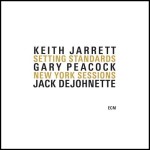social bookmarking tools:
 |
|
| Available RSS Feeds |
|---|
 - Top Picks - Top Picks |
 - Today's Music - Today's Music |
 - Editor's Blog - Editor's Blog
|
 - Articles - Articles
|
Add Louisville Music News' RSS Feed to Your Yahoo!
|
Revisiting Some Old Friends
Setting Standards - New York Sessions (ECM)
Keith Jarrett
By Martin Z. Kasdan Jr.
Keith Jarrett is one of the preeminent living jazz pianists. He began his career in the 1960s, gaining prominence through high profile recordings and concerts with Charles Lloyd and Miles Davis. He was one of the first artists to record for the ECM label, beginning with his solo album Facing You in 1972.
ECM is celebrating the 25th anniversary of Jarrett's first trio recordings with bassist Gary Peacock and drummer Jack DeJohnette by releasing a three-disc box set of their first three albums, all recorded in January of 1983. As a musician known for his original compositions and spontaneous solo improvisations, Jarrett surprised many of his fans because of the heavy reliance on music from the American Songbook. These albums were originally released as Standards, Volumes 1 and 2 and Changes. The trio has come to be known as the "Standards Trio," and these seminal recordings provide the template for the ensuing quarter-century (and counting) of their musical interplay.
Volumes 1 and 2 between them comprise 11 songs, only one of which is a Jarrett composition, namely "So Tender," which opens Volume 2. Coming after such pieces as "All the Things You Are" and "God Bless the Child" on the first album, it feels like some long-lost standard itself and serves as a prelude to the trio's interpretations of such well-known pieces as "If I Should Lose You" and "I Fall In Love Too Easily" on the second disc.
The trio's forte is extended improvisation. The musicians take the well-known melodies of the songs and use them as not just vehicles for improvisation, but as launching pads for updating the approaches to these pieces, which have been rendered by so many jazz artists over the decades. My favorite example is Billie Holiday's "God Bless the Child," which the artists turn into a 15-minute tour de force that is not a second too long. It employs funk rhythm patterns not unlike those utilized by Jarrett and DeJohnette in some of their outings with Lloyd some 15 years earlier.
Changes, the final disc, is a departure, as it contains no standards and is made up of two compositions by Jarrett: "Flying" (divided into Parts 1 and 2, a relic of the vinyl time limitations) and "Prism." The first piece unfolds in a manner reminiscent of Jarrett's 1975 solo classic "The Köln Concert." Subtle colorations by DeJohnette's cymbals and gongs, combined with Peacock's rich bass work, gradually lead into tapestries of sound. "Prism" closes the album and the box set, with more melodious beauty.
This is a good introduction to the work of the "Standards Trio" for those who may not have previously heard this ensemble. Longtime fans who already own these recordings should be aware that this box set does not contain any previously unreleased alternate takes or bonus cuts. There is a booklet included, with new liner notes by Swiss critic Peter Rüedi and previously unpublished photographs from the sessions, as well as some more recent pictures.
Find out more at www.keithjarret.org.

